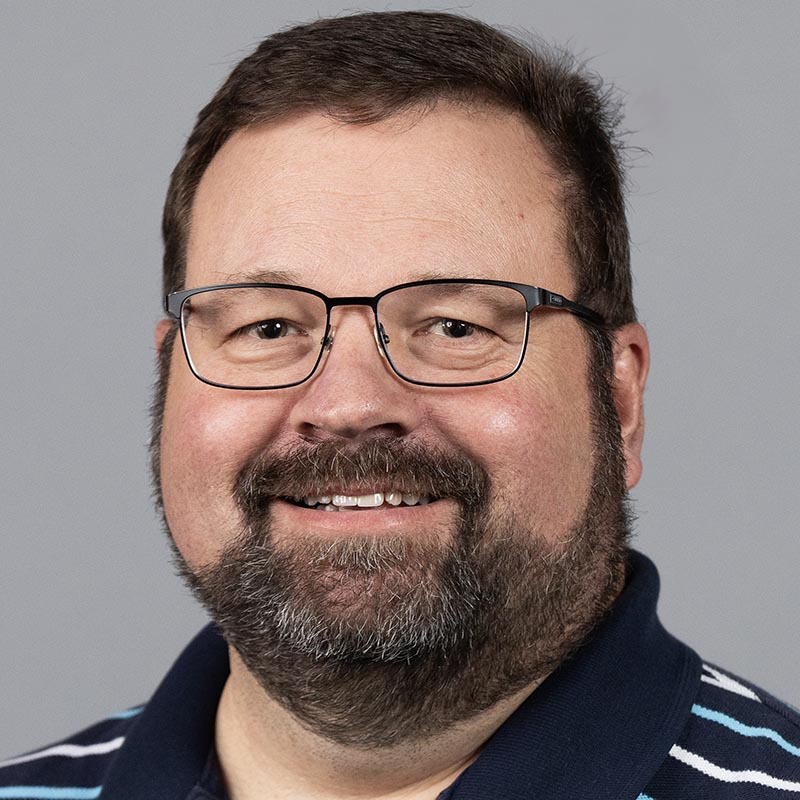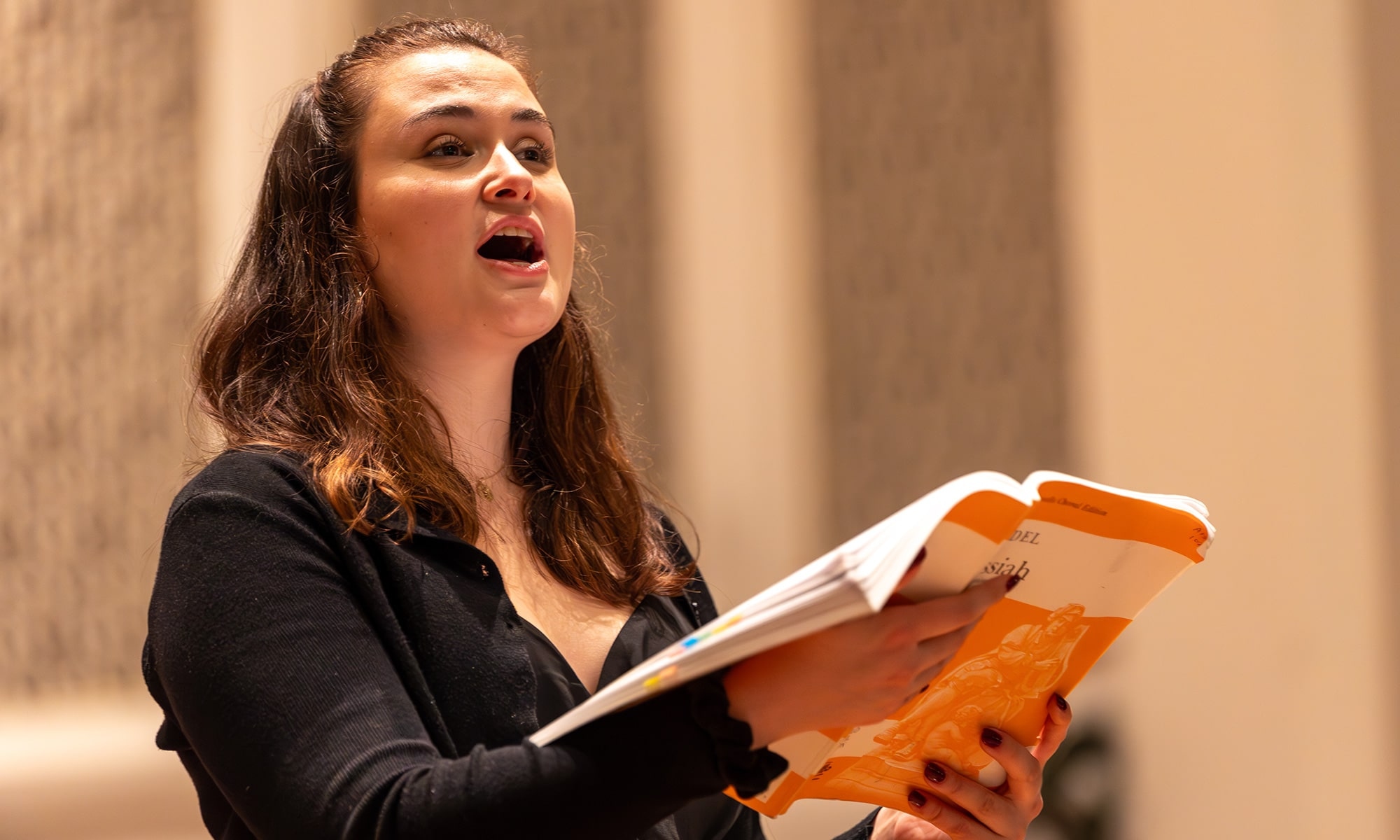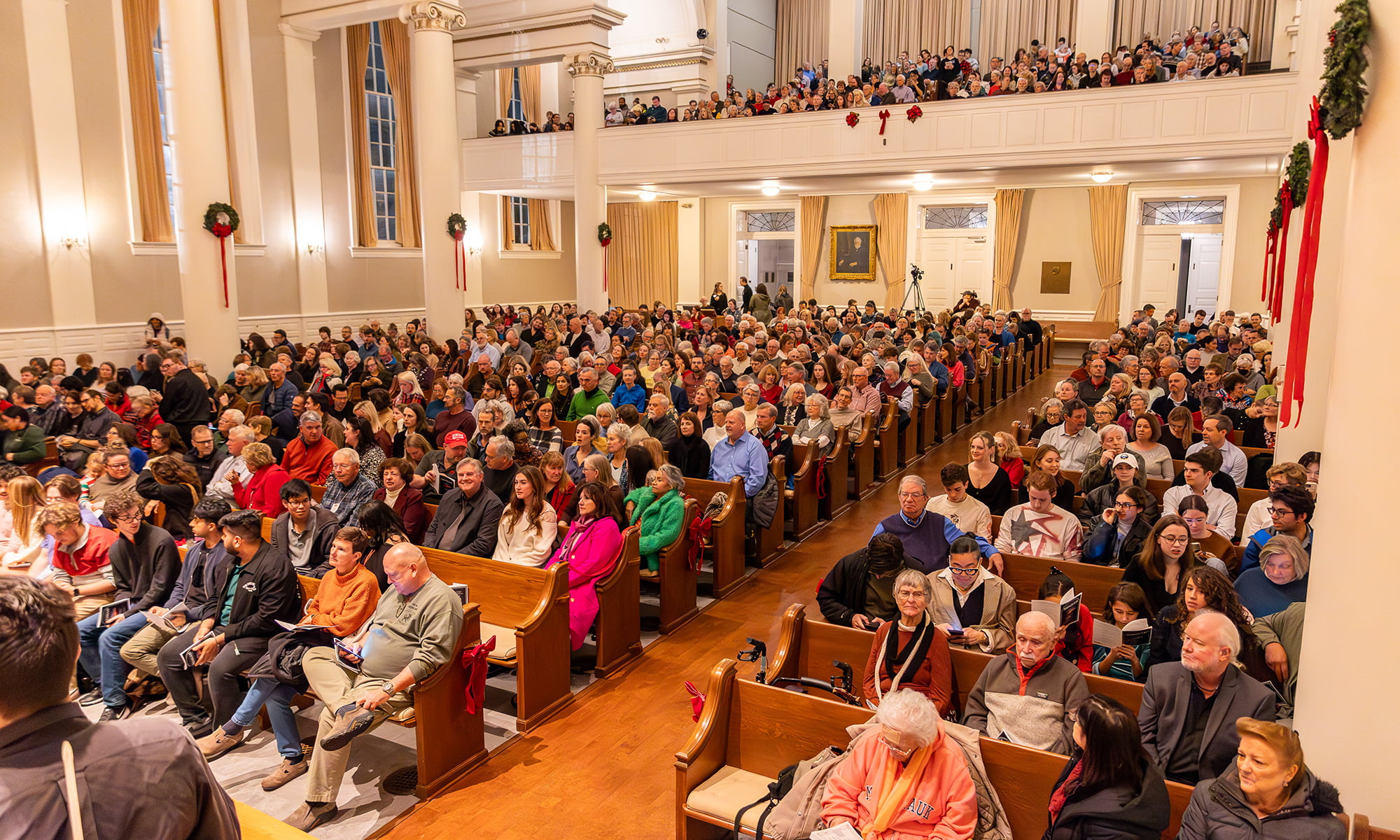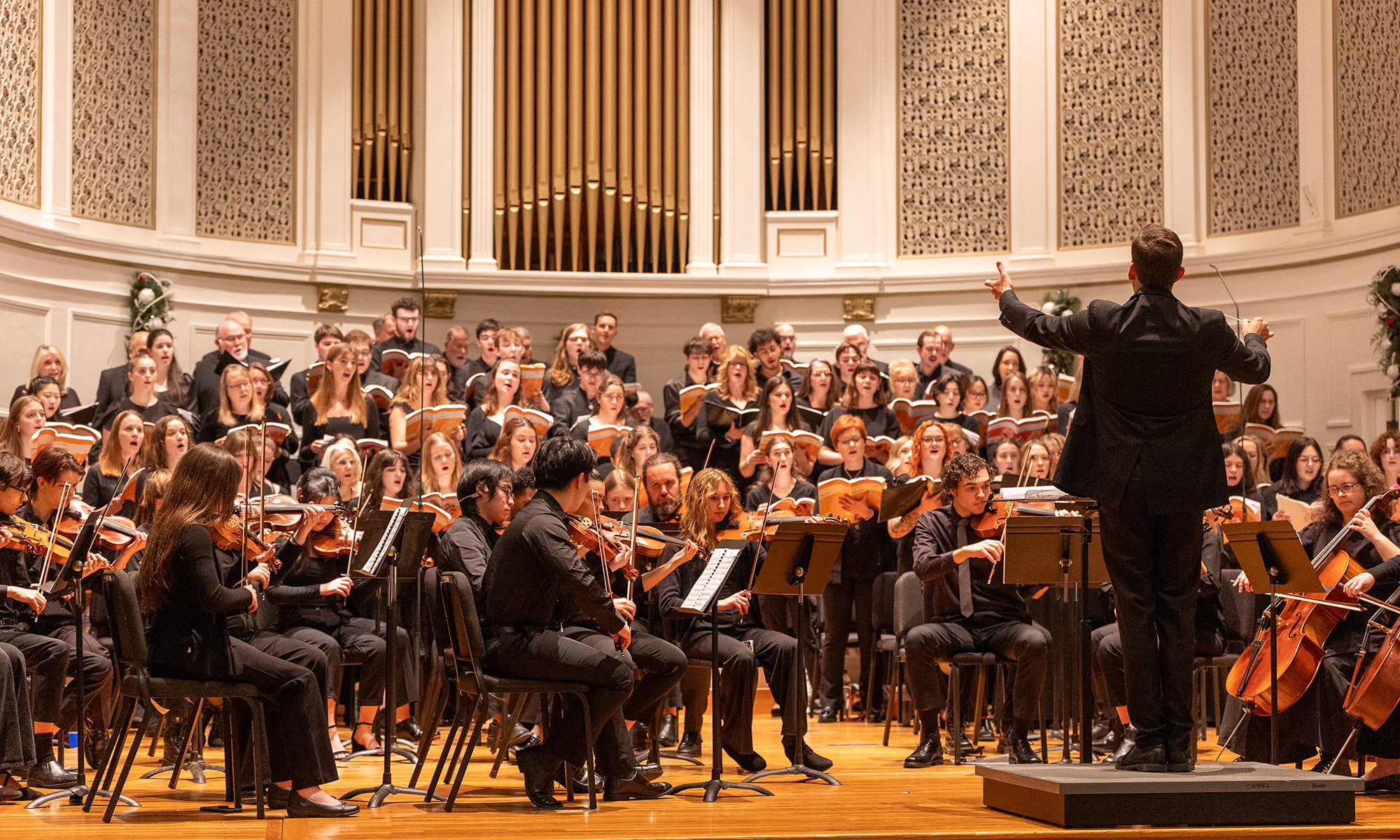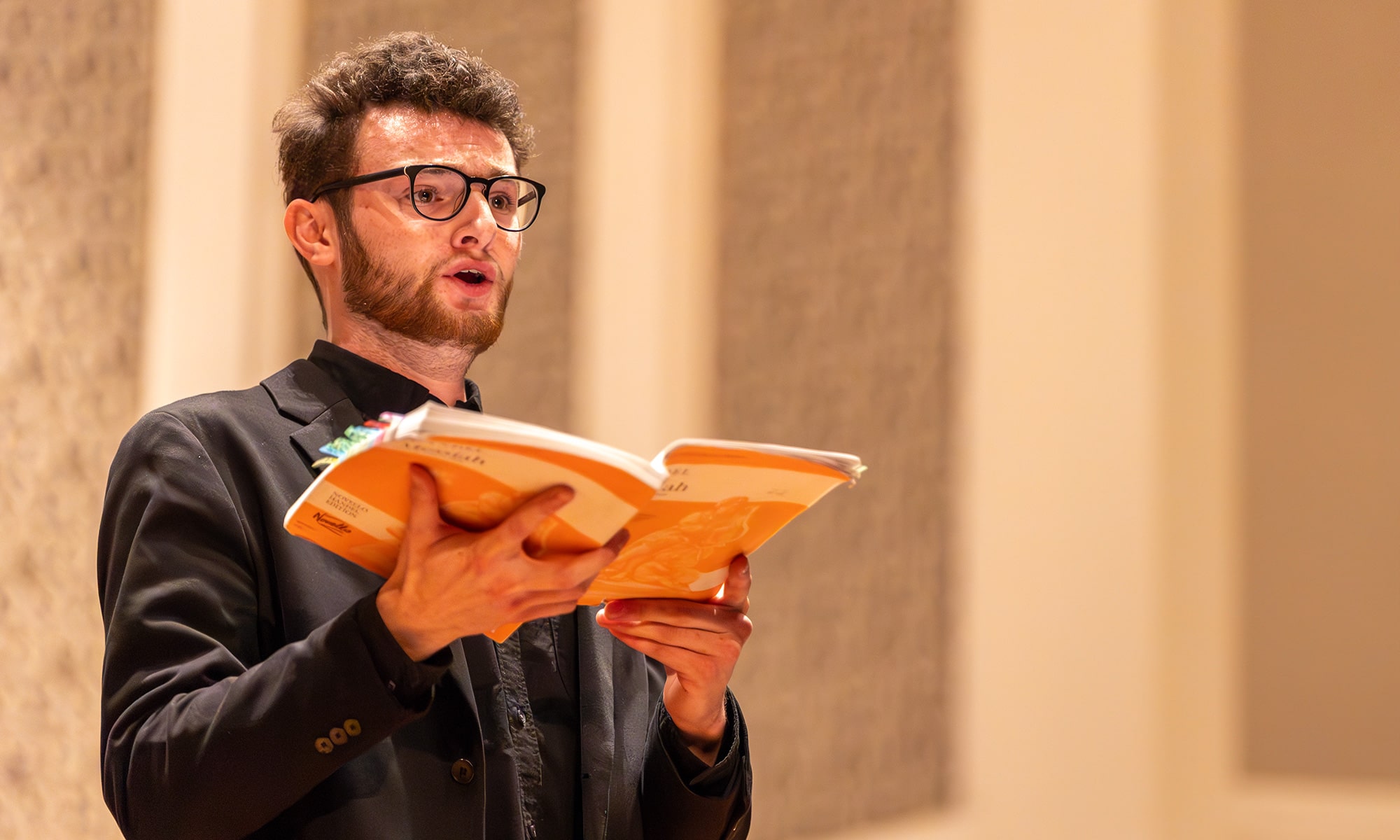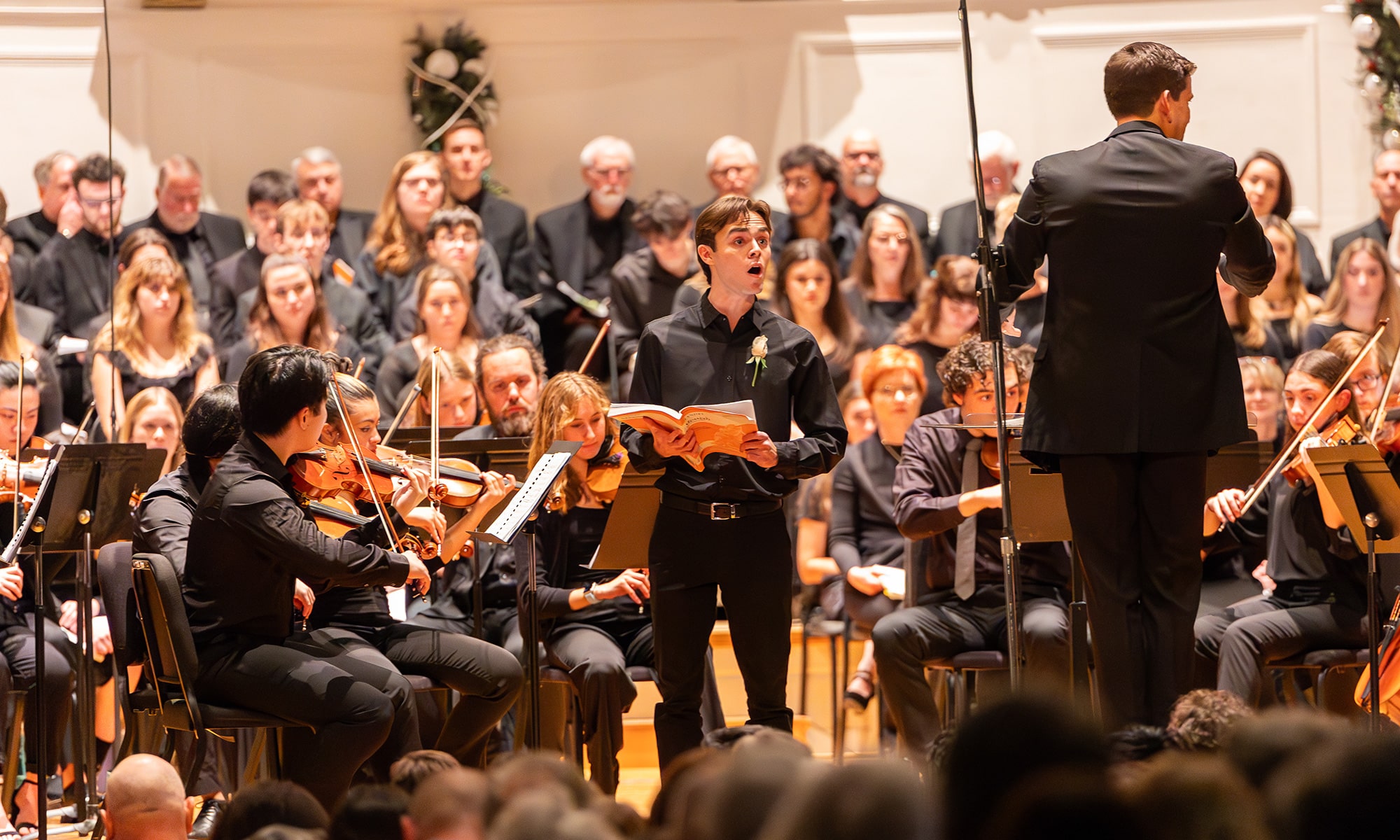The Michael D. Eisner Center for the Performing Arts often remains hopping after dark.
On the Wednesday night before Thanksgiving, students caught up on homework, lounged in the common areas, and polished their performances in practice rooms. Someone played a piano, their finish drawing applause.
Burke Rehearsal Hall drew the most attention.
Inside, the Denison Symphony Orchestra soared while mezzo-soprano Lilah Landsman ’25 sang an aria from Handel’s Messiah called “O thou tellest good tidings to Zion.”
Written in a matter of weeks in 1741 by George Frideric Handel, Messiah endures as a repertory classic around the world, particularly during the holiday season. In his written history of Denison University choir performances, Professor Emeritus William Osborne places the college’s first full performance of Messiah in 1910. Since then, it has been performed dozens of times, most recently on a four-year cycle begun by Osborne in 1964.
On this particular night, Landsman was preparing for the Dec. 1, 2023, performance in Swasey Chapel. Her accidental Eisner audience wouldn’t know it, but they were hearing the newest verses in a time-honored piece of Denison history.
Swasey Chapel was packed on Dec. 1, 2023, for a December tradition at Denison. Once every four years, members of the Chamber Singers, Concert Choir, and Denison Symphony Orchestra come together to perform Handel’s Messiah.
Messiah is the fruit of the combined labor of the Denison Symphony Orchestra and two choirs: the roughly 30 students who make up the Chamber Singers, and the Concert Choir, a combined student-community vocal group numbering about 70.
After that first Denison performance in 1910, records suggest that Messiah was presented every year, often twice, until about 1960. By then, Osborne wrote, the performance had become so loved at Denison that his predecessor “aroused considerable ire by reducing Messiah performances to alternate years; I increased that reaction by deciding to present the work once a student generation.”
The Covid pandemic threw off that schedule. The 2023 performance of Messiah was the first in five years, and the first to be conducted by assistant professor Harris Ipock, Denison’s director of choral activities.
“It’s a cornerstone of musical literature, and my predecessors wanted to make sure that students who were in choir for all four years would get to perform it at least once while they are here,” Ipock said.
The performance caps weeks of hard work, he said.
“There’s a lot of instruction that goes into the style and just how the music is constructed,” Ipock said. “It’s very different from a lot of the music that students have sung and played before.”
The preparation of such an involved piece is an invaluable learning experience for everyone involved, said Assistant Professor Philip Rudd, Denison’s director of orchestras.
“It puts us out of our status quo, and that’s a good thing,” said Rudd, who played alongside the student violin section in this year’s performance. “There’s a lot of value and enjoyment in putting the orchestral and choral forces together like this.”
Also this year, they tried something different.
This was the first performance of Messiah at Denison in which students, not professional guest artists, performed the solo arias and accompanied recitatives.
Gabe Donnelly ’25, a soloist in the 2023 performance of Handel’s Messiah, enjoyed his role in a Denison tradition dating to 1910.
One of those history-making student soloists was Gabe Donnelly ’25.
When he picked up his copy of Messiah earlier this fall, Donnelly saw there was a sticker partly affixed to the front cover. Donnelly belongs to the Hilltoppers, Denison’s all-male a cappella group, and he recognized the name on the sticker as a former Hilltopper, Harrison DeChant ’20.
Donnelly liked this idea, that he was sharing a Denison tradition with a Hilltopper alum.
“The sticker started to fall off, so I put it on the inside flap,” he said. “I didn’t want to lose it.”
Music has been part of his life for a long time, and the junior history major came to Denison in part so he could remain active in the arts.
Maximilian Wisnefski ’24 said his singing in Messiah allowed him to flex musical muscles he hadn’t used in a while.
That was equally true for Maximilian Wisnefski ’24, a data analytics major.
“I didn’t want to pursue the arts professionally, but I wanted it to remain part of my life,” he said. “That’s part of the reason I ended up at Denison. I’m able to pursue these disparate interests.”
He jumped at the chance to audition for a Messiah solo.
“It’s really cool, giving students the opportunity to do the solos,” he said. “It’s been a long time since I’ve sung music like this. It’s fun to flex those muscles a little bit.”
The musical muscles were flexed the night of Dec. 1. Messiah was presented to a full Swasey house that rose to its feet in unison for the final Hallelujah chorus.
“I was really proud of everyone,” said Megan Barker ’25, a soprano and double major in music performance and English literature. She relished the chance to perform a solo — “the runs are so fun and it’s just the right amount of challenging” — but she also savored those moments of “bigger energy” that a combined performance like Messiah can produce.
Landsman said she sometimes lets nerves get the better of her, but she was happy with her solo.
“I saw my teacher (voice instructor Emily Noël) in the audience, and a wave of calm came over me,” she said. “I just really wanted to go up there and do it for myself.
“I’m so overwhelmed with gratitude,” she said. “There’s something so beautiful about the collaboration. We all shared this special moment.”
Donnelly felt that too. As the audience filtered out of Swasey and his parents beamed beside him, he opened his copy of Messiah to show the sticker that had caught his fancy at the start of the semester. Beneath DeChant’s name, he had written his own.
